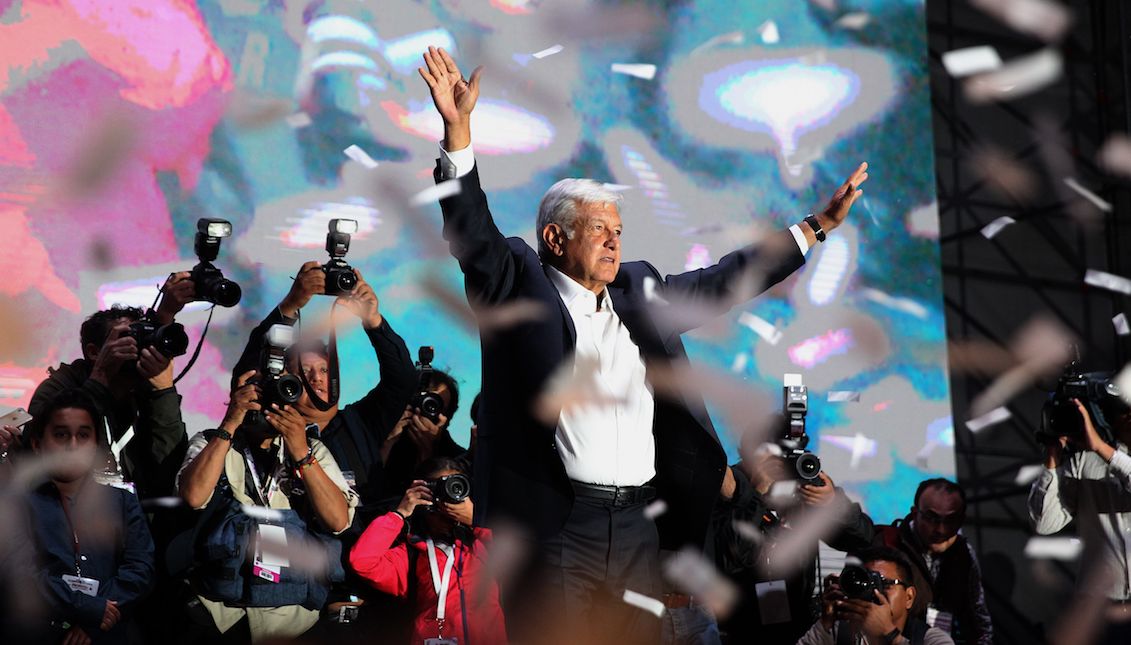
Andrés Manuel López Obrador, Mexico’s new populist president
After an overwhelming victory, the populist leftist candidate defeated the bipartisan machinery of the Central American country, marking a new era in regional…
During the largest electoral day in the history of the country, almost 90 million Mexicans had the opportunity to choose 18,000 public officials, their new president among them.
On Sunday, Mexico inaugurated a new political period framed in the battle against corruption and violence, and fueled by President Trump’s attacks against border immigration.
Citizens went to the polls to express their discontent with a bipartisan tradition of more than 90 years, exemplified by current president Enrique Peña Nieto, and the radicalization of violence and corruption throughout the country.
This was the formula that allowed the victory of a third option, Andrés Manuel López Obrador (known by his initials as AMLO), who founded his party Morena only four years ago, after two unsuccessful runs for president in 2006 and 2012.
The new president "drew intense support from Mexicans, as hundreds of thousands flooded stadiums, city plazas, and other events to get a glimpse of him," explained Politico. "Those crowds have grown over the last few months - and wrapped up on Wednesday with more than 90,000 supporters at a stadium here to close out his campaign with a concert-like festival."
The 64-year-old politician coasted to victory with 53% of the vote, a margin "far greater than what the polls gave him," the BBC stated, thus achieving a victory "even bigger than what was expected" over the Conservative Ricardo Anaya, 39, of the Por México al Frente coalition.
According to the media, the key to López Obrador's success was the creation of a more conciliatory platform than that of the traditional parties, seeking to reunify the popular vote in a new proposal.
The merger of businessmen, former members of the right-wing party and even the Partido Encuentro Social (PES), which has a strong religious tradition, facilitated this effort in an attempt to attract votes from all sections.
Another contributing factor, as explained by the sociologist Roger Bartra, is that "in Mexico there is widespread anger, especially because of the insecurity and corruption in the different government layers," which created a kind of "punishment vote" against the political tradition and in favor of AMLO.
"Eradicating corruption and impunity will be the main mission of the new government," said the candidate in his victory speech. "Under no circumstances, will the next president of the Republic allow corruption or impunity."
But many critics foresee that his government, driven by a populist campaign, could fall back on old authoritarian models that leftist governments have been established in Latin America in the past.
RELATED CONTENT
AMLO has defended himself by ensuring that "he does not aspire to install an 'open or covert' dictatorship and that his thinking is synthesized in one sentence: 'For the good of all, the poor first.'"
"The changes will be profound, but they will occur in accordance with the established legal order. There will be business freedom, freedom of expression, association, and belief," he said.
In addition, AMLO said that "it would forge a new relationship with the United States based on mutual respect and in defense of our countrymen who work and live honestly in that country," CNN reported.
He also added that "migration must be made by choice, not by necessity," promising to "strengthen the domestic market to try to produce in the country what we consume and so that Mexicans can work and be happy where they were born, where their family is, where their customs and their cultures are."
While President Trump congratulated the president-elect on Twitter and expressed his hope to "work together for the benefit of the United States and Mexico," AMLO has made clear his positions regarding the neighboring administration, rejecting Trump's threats to withdraw from the North American Free Trade Agreement (NAFTA), as well as the construction of a border wall, an issue that was further developed in the candidate's book entitled "Oye Trump".
After his victory, AMLO must wait for the final count of votes to be finalized on Wednesday, when he will be proclaimed president-elect. Likewise, the government transition process will be carried out during the next months, leading up to his inauguration in early December.
However, the president-elect already "announced that the former Supreme Court minister, Olga Sánchez Cordero, will be in charge of internal policy issues in the transition along with Tatiana Clouthier, the campaign coordinator," El País reported.











LEAVE A COMMENT:
Join the discussion! Leave a comment.